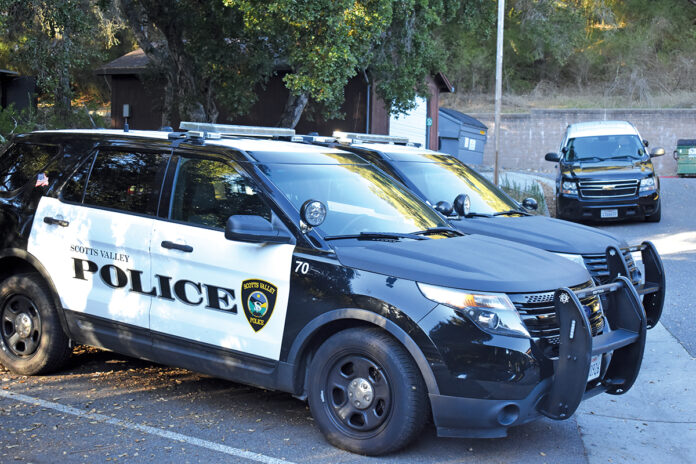A district court judge has allowed a UC Santa Cruz administrator’s unlawful search lawsuit against the City of Scotts Valley and its police force to proceed.
Plaintiff Darin Matthews named four Scotts Valley officers—along with a Santa Cruz County Sheriff’s deputy—as defendants in the action, which claims he was pulled over illegally, that officers used inappropriate force and that the warrant to search his house wasn’t obtained properly.
Authorities did not report discovering anything illegal during any of the searches.
A Santa Cruz County spokesperson declined to comment on the lawsuit. The City of Scotts Valley did not respond to an interview request.
Their warrant was “bogus,” Matthews’ Soquel-based lawyer Kathleen E. Wells told the Press Banner, adding officers made a big “show” of arresting her client in a public place.
“They found nothing,” she said. “They also asked him questions about a pot bust in Las Vegas. I have proof that there was never anything to do with that.”
Matthews’ original complaint was thrown out, but on Jan. 14 California Northern District Judge Edward Davila allowed his amended complaint to proceed, in part.
On Feb. 19, 2019, around 6:30am, Matthews’ vehicle was stopped by a marked SVPD vehicle as he left for work, per the suit. He argues police were lying in wait.
According to Wells, Officers said they stopped her client because he had paper plates on his vehicle. In the suit, Matthews says he explained to police he’d just bought it in Oregon and offered to show them the paperwork. But they weren’t interested, he says.
The amended complaint claims Scotts Valley police were using a temporary-plates “pretext” as an excuse to pull him over. He provided his California driver’s license when asked, he adds.
According to the suit, one officer held his hands behind his back while another pat-searched him, as several other police cruisers suddenly appeared, including a Sheriff’s Office vehicle.
That’s when deputy Steven Carney approached and ordered Matthews to sit on the bumper of one of the police vehicles, while officers went through his vehicle and searched a backpack they found inside, according to Matthews.
But they didn’t have a warrant to do this and didn’t ask permission first, Wells said, although defendants argue Matthews gave consent at the time.
In the moment, Carney told Matthews they had a search warrant for his home and asked why the Las Vegas Police Department would know his name, Matthews says, adding he replied he’d never so much as received a parking ticket in Las Vegas.
The plaintiff says Carney made false statements to a Superior Court Judge to get the search warrant for his residence, so the Sheriff’s Office could search his home under false pretenses.
The claim states Matthews believes his constitutional right to protection from unreasonable search and seizure was violated by defendants—although he didn’t lump the City of Scotts Valley for that claim.
However, the City became part of his municipal liability claim, alongside Santa Cruz County.
Matthews argued a false arrest and unlawful search claim against all defendants under California law. He also launched an assault and battery claim, in addition to a “negligent infliction of emotional distress” claim against all defendants.
Scotts Valley officers Wayne Belville, Michael Birley, Michael Neronde and Paul Lopez are all defendants in the suit.
In the end, Davila dismissed most of the claims, because he failed to address arguments that they should be tossed. Wells says she wanted to focus on the illegal-search aspect of the case.
The judge allowed Matthews’ claim that his Fourth Amendment right to be free from unlawful searches could go ahead.
“When performing an investigatory stop of a vehicle, an officer must have at least reasonable suspicion that criminal activity is taking place,” Davila wrote, referring to a 2014 Supreme Court decision. “According to the (amended complaint), the Officers’ only stated explanation for the stop was Matthews’ paper license plates, which Matthews alleges was a pretext. These facts are sufficient to state (an unconstitutional search) claim based upon an unlawful vehicle stop.”
And even if that were a valid reason, it wouldn’t be enough to assume he was armed, Davila added.
“Driving with a temporary license plate, without more, does not support a reasonable belief that the Officers were dealing with an armed and dangerous individual,” he said. “Thus, Matthews’ allegations are sufficient to allege an unlawful frisk.”
He also agreed Matthews had effectively made his argument that his backpack shouldn’t have been searched, so this claim will make it to the next legal round, too.
But Scotts Valley’s lawyers successfully whittled down Matthew’s unconstitutional search argument, at least to the extent it’s based on the theory that officers used unreasonable force and didn’t take enough steps to protect him.
“Matthews does not address the City Defendants’ challenges. By failing to do so, Matthews has conceded the arguments,” Davila wrote. “Accordingly, Matthews is barred from pursuing the unreasonable force and failure to protect theories as part of his (unconstitutional search) claim.”
The City of Scotts Valley, Belville, Birley, Neronde and Lopez have until Feb. 11, to respond to the judgment.
Wells says the parties are planning to meet to discuss a possible settlement.










